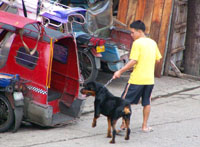
 |
|
| |
|
Sta. Barbara tops 'high dog-bites' list in Iloilo
|
 |
With 141 on record for the period January to June this year alone, the Municipality of Sta. Barbara topped the list followed by the Municipality of Miag-ao with 100 cases validated. The list continues with the towns of Cabatuan at 89 incidents, Leon with 85, Tigbauan with 76, Oton with 69, San Joaquin with 63, Maasin with 62, Dingle with 58 and Estancia with 53.
This, The News Today learned from PVO chief, Dr. Silvino Teodosio Jr. with the province summing up its data on the recent rabies summit. Asked on the reasons that bring about the increasing dog-bite incidents, Teodosio said foremost of the factor is the uncontrolled increase of dog population. Another contributing factor is the presence of stray dogs in public places where most of the incidents are usually monitored.
As such, he calls on dog owners to be responsible and adhere to dog leashing. As for stray dogs, the 'relief' comes from the full enforcement of dog ordinances in place in just about all Iloilo towns. One of the methods of intervention propagated by the PVO is the "on-the-spot termination and disposal" of stray dogs provided it goes within the provisions of the Animal Welfare Act of 1998.
The Animal Welfare Act stipulates that only licensed firearms shall be used in the stray dog termination with sharpshooters and members of the Philippine National Police or deputized gun clubs authorized to perform such.
The PVO chief also reiterated his call for an all-out community support particularly from barangay officials in pushing for barangay dog registration and mass dog vaccination. On top of the alarm sent out on high incidence of dog bites, Teodosio extensively works for the control in the spread of rabies.
"Dogs in the category of being stray, unregistered and unvaccinated are more of a problem rather than any help or benefit. These dogs are the principal reservoir of rabies. These are the animals that collect and then spread rabies," he stressed. "This is a problem that cannot be ignored. The longer we wait , the harder it will be to eliminate rabies and the more the roster of people who will die before their time. We have the resources to solve the problem but most of all, we have the willpower to get things done."